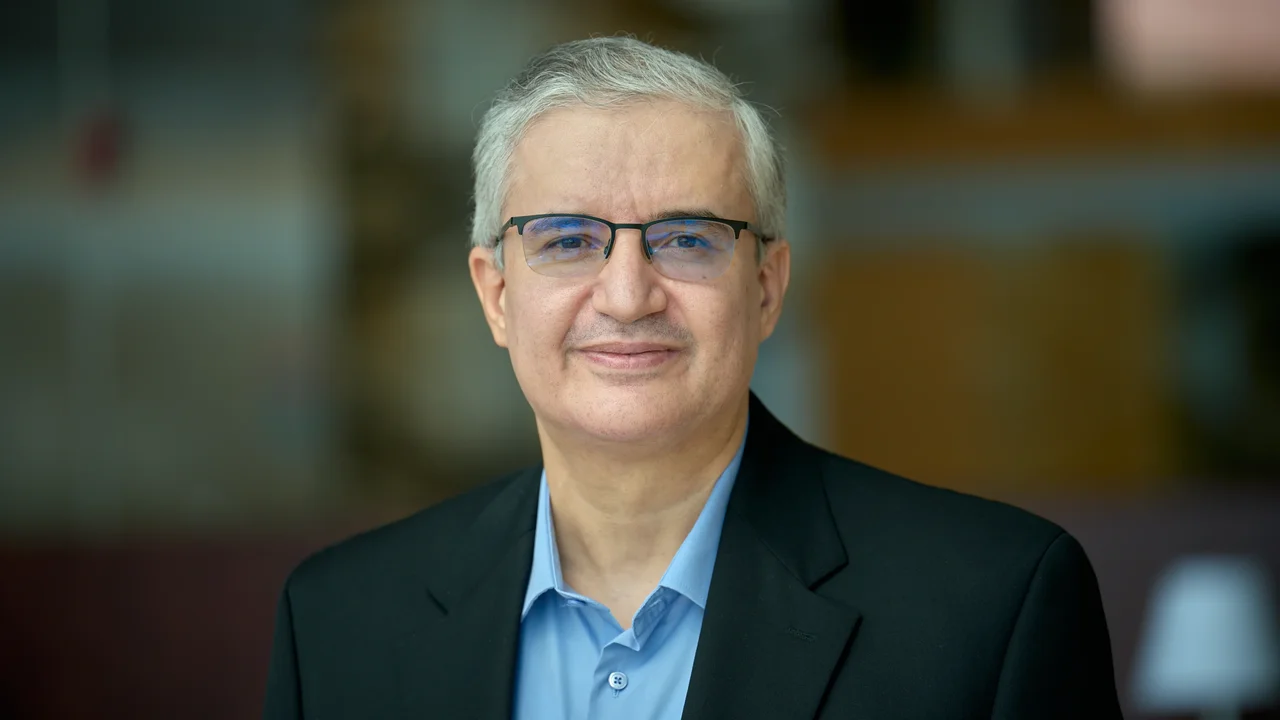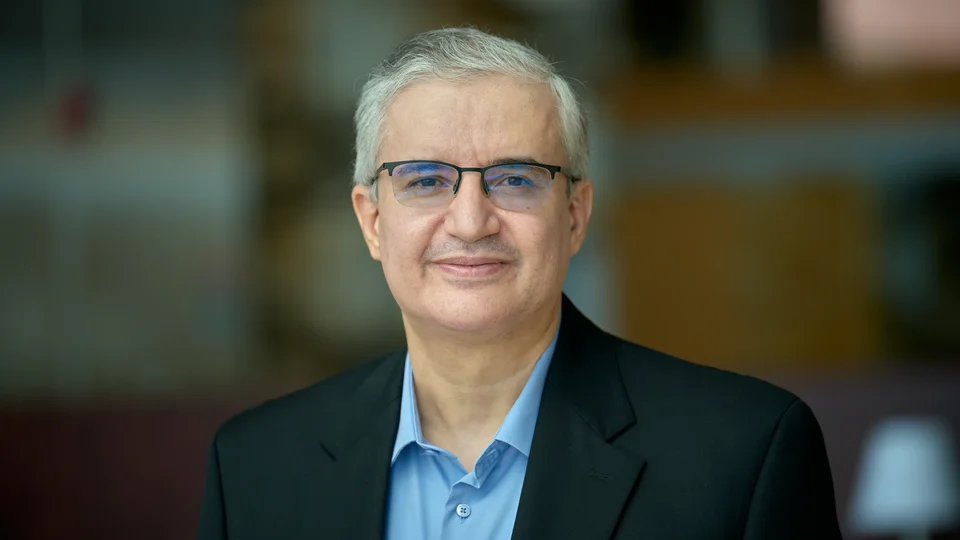
Mohamed-Slim Alouini
- Al-Khawarzmi Distinguished Professor, Electrical and Computer Engineering
- Principal Investigator, Communication Theory Lab
- UNESCO Chair, UNESCO Chair on Education to Connect the Unconnected
KAUST is a fertile place for any researcher who wants to develop rigorous computational and engineering methods to solve real-world problems. Its unique support of science allows the most advanced scientific revolution.
Biography
Throughout his 30-year academic career, Professor Mohamed-Slim Alouini, an IEEE, OPTICA, and SPIE Fellow, has developed analytical and simulation tools for evaluating the performance of radio-frequency and optical wireless communication systems. He has also designed and optimized innovative technologies for emerging wireless networks.
Professor Alouini, a co-founder of KAUST's ECE program, inspires future engineers through his pioneering work in wireless communications. His integrated space-air-ground networks, spectrum sharing schemes, and optical wireless communication systems research shape connectivity's future and embody KAUST's scientific excellence and global impact.
Professor Alouini has published numerous conference and journal papers and co-authored the textbook Digital Communication over Fading Channels, published by Wiley Interscience. A former editor of IEEE Transactions on Communications and IEEE Transactions on Wireless Communication, he also served as an editor for IEEE Transactions on Mobile Computing and the Wireless Communications and Mobile Computing journal. He was also a series editor for the IEEE Communication Magazine's Optical Communication and Networks Special Series and the founding field chief editor for the Frontiers in Communications and Networks journal. He is now the Founding Editor-in-Chief for the Nature Partnership Journal (npj) on Wireless Technologies (since 2025) and an editor for the IEEE Transactions on Aerospace and Electronics Systems (since 2022).
Professor Alouini has been an IEEE Distinguished Lecturer for the IEEE Communication Society (2016-2017), the IEEE Vehicular Technology Society (2018-2022), the IEEE Aerospace and Electronic Systems Society (2023-2024), the IEEE Photonics Society (2025), and the IEEE Society on Social Implications of Technology (2026-Present).
Research Interests
In addition to diversity combining techniques and MIMO techniques, Professor Alouini is interested in multi-hop and cooperative communications, optical wireless communication systems, cognitive radio systems, green communication systems, underwater/maritime communication systems, and integrated ground-airborne-space networks for research.
Professor Alouini is actively working on addressing the uneven global distribution, access to, and use of information and communication technologies (ICT) by studying and developing new generations of aerial and space networks as a solution to provide connectivity to rural, low-income, disaster-prone, and/or hard-to-reach areas.
His KAUST Communication Theory Lab (CTL) investigates viable solutions to minimize ICT costs by (i) capitalizing on emerging and new solutions that operate within the unlicensed radio frequency spectrum and by (ii) deploying a variety of aerial and space-based networks.
About
Professor Mohamed-Slim Alouini is the Al-Khawarizmi Distinguished Professor of Electrical and Computer Engineering (ECE), the principal investigator of the Communication Theory Lab (CTL) at KAUST, and the holder of the UNESCO Chair on "Education to Connect the Unconnected". He is also an Affiliate Professor of Applied Mathematics and Computational Science (AMCS) and an Affiliate Professor of Statistics (STAT).
Awards and Distinctions
- International Member, The U.S. National Academy of Engineering (NAE), 2026
- Fellow Society of Photo-Optical Instrumentation Engineers (SPIE), 2025
- Distinguished Service Award of the IEEE Communication Society Technical Committee on Space and Satellite Communication (SSC), 2024
- Fellow of the International Science Council (ISC), 2023
- UNESCO Chair on “Education for Connecting the Unconnected”, 2023
- Fellow of the World Wireless Research Forum (WWRF), 2022
- Fellow of the UNESCO The World Academy of Science (TWAS), 2022
- UNESCO The World Academy of Science (TWAS) Award in Engineering Sciences, 2022
- TAKREEM Foundation Award in the “Scientific & Technological Achievement” Category, 2021
- IEEE Communication Society Education Award, 2021
- NSP Obada Prize (Supported by the African Academy of Sciences), 2021
- Fellow of OPTICA (formerly known as the Optical Society of America (OSA)), 2021
- Member of the Organization of Islamic Cooperation (OIC) Standing Committee on Scientific and Technological Cooperation (COMSTECH) Distinguished Scholars Program, 2021
- Fellow of Asia-Pacific Artificial Intelligence Association (AAIA), 2021
- Kuwait Prize in Applied Sciences, 2020
- IEEE Vehicular Technology Society James Evans Avant Garde Award, 2020
- Technical Achievement Award of the IEEE Communication Society Communication Theory Technical Committee, 2019
- Member of the Academia Europaea (AE), 2019
- Member of the European Academy of Science and Arts (EASA), 2019
- Fellow of the African Academy and Science (AAS), 2018
- Inaugural Organization of Islamic Cooperation (OIC) Science & Technology Achievement Award in Engineering Sciences, 2017
- Abdul Hameed Shoman Award for Arab Researchers in Engineering Sciences, 2016
- Recognition Award of the IEEE Communication Society Wireless Technical Committee, 2016
- Fellow of the Institute of Electrical and Electronics Engineers (IEEE), 2009
- US National Science Foundation (NSF) CAREER Award, 1999
- Charles Wilts Prize for outstanding independent research leading to a PhD degree in Electrical Engineering at Caltech, 1999
- IEEE Distinguished Lecturer for the IEEE Communication Society, the IEEE Vehicular Technology Society, the IEEE Aerospace and Electronic Systems Society, the IEEE Photonics Society, and IEEE Society on Social Implications of Technology, 2016 - 2028
Education
- Doctor of Philosophy (Ph.D.)
- Electrical Engineering, California Institute of Technology, United States, 1998
- Master of Science (M.S.)
- Electrical Engineering, Georgia Institute of Technology, United States, 1995
- Diplome d'Etudes Approfondies (DEA)
- Electronics, Pierre and Marie Curie University, France, 1993
- Diplôme d'Ingénieur
- Telecommunications, Telecom Paris, France, 1993
Related Media
Patents
Publication number: 20180213543
Publication number: 20180198203
Publication number: 20170366304
Adaptive Modulation Scheme With Simultaneous Voice And Data Transmission
Patent number: 6304593
Robust Node Estimation And Topology Discovery For Large-scale Networks
Publication number: 20180227188
Publication number: 20180052219
Generation Of Correlated Finite Alphabet Waveforms Using Gaussian Random Variables
Publication number: 20160013819

